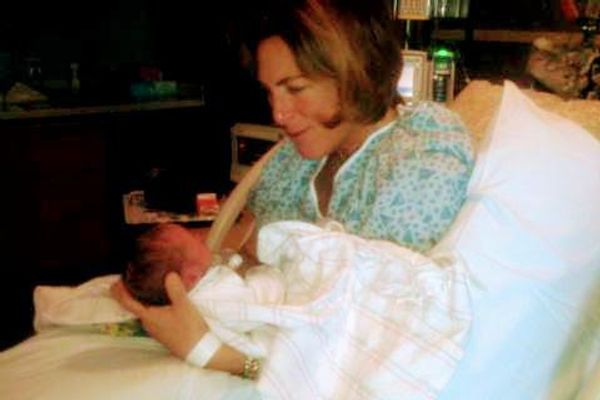Debora Grandison was 26 weeks pregnant with her second child and enjoying lunch with coworkers on a typical workday. “Suddenly, I felt the baby drop,” she said. Since her first child had been born two months early, Grandison knew she had to reach the hospital.
There, doctors told her she was in active labor and gave her a drug to relax her uterine contractions. Instead of her contractions slowing, her heart rate tripled. “I thought I was dying. Honestly. I felt like I was floating away, like I was leaving,” Grandison remembered. Doctors rushed her to the intensive care unit.
Eventually, Grandison’s doctors told her she had an underlying heart issue that interacted with the medicine they gave her, and according to Grandison, they accused her of withholding this piece of her health history. “They said, ‘You had to have known you had a heart murmur,” Grandison said. But, in fact, in spite of having regular checkups, she did not.
Grandison was diagnosed with mitral valve disease and remained hospitalized for more than two months while doctors stabilized her heart and her pregnancy. Grandison also learned she had gestational diabetes. She was finally sent home on complete bed rest. “I was scared to death I was going to lose this baby,” Grandison said.
But Grandison carried her son to full term, 39 weeks, and he was born healthy. As he grew and thrived, Grandison’s health deteriorated. She experienced left arm pain, shortness of breath and heart palpitations. “It felt like someone was punching me in the chest when I was walking up the stairs,” Grandison said. “I went to the ER several times thinking I was having heart attacks. I was told it was anxiety.” Grandison’s doctor prescribed medication for every symptom she experienced, until she was on 13 separate medications. She felt sicker than ever.
Her blood sugar was finally tested at one of her many ER visits. Grandison learned her blood glucose levels were 683. “Most people with those glucose levels are not sitting up talking,” Grandison said. “I didn’t know I had diabetes, and that I was at high risk for developing diabetes after having gestational diabetes. I was told my risks were amputation, blindness and kidney disease, and that 95% of women go back to normal after pregnancy.”
Nobody made the connection between Grandison’s heart issues in her second pregnancy with the preterm delivery of her first baby even though delivering a baby preterm, or before 37 weeks, has been found to double a woman's risk of developing heart disease and is strongly associated with stroke and heart disease later in life. If the baby is born earlier than 28 weeks, this risk quadruples. In addition, gestational diabetes is linked to future heart disease. Grandison was never told she had multiple risk factors.
In fact, her heart issue had been misdiagnosed in the ICU. She spent the next 20 years after her son’s birth being treated for mitral valve disease. When she moved and changed doctors, her medical team finally diagnosed the heart issue as an electrical problem and installed a pacemaker. Although she was nervous about getting the pacemaker, afterward Grandison felt better than she had in decades.
Dr. Judette Louis, College of Medicine Obstetrics & Gynecology chair at University of South Florida, said the link between preterm birth and heart disease is well established in research.
“Women should be aware that this is [an unchangeable] risk factor,” said Louis. The reason behind the preterm birth also affects this risk. Preterm birth caused by high blood pressure or gestational diabetes increases the risk of future heart disease more than preterm birth that results from unknown reasons or because of cervical issues.
What’s less clear, said Louis, is what the underlying causes are. Does preterm birth damage the heart and blood system in moms? Or does preterm birth simply uncover or worsen a mom’s underlying heart condition? Louis said researchers are searching for these answers.
Women can arm themselves against diabetes and heart disease by reducing the risk factors they can control. “There are risk factors for heart disease and diabetes that are modifiable, such as smoking or having a sedentary lifestyle. Quit smoking. Exercise. Eat a diet rich in fruits and vegetables and whole grains,” Louis said. “Preventing heart disease, preventing diabetes: That’s the goal.”
Louis advised women to be aware of heart disease symptoms. “Chest pain is typical, but there are atypical symptoms like arm or back pain, irregular heartbeat, heartburn or extreme fatigue,” said Louis. “Sometimes there are no symptoms at all, which is why regular checkups with your primary care physician are important.”
Instead of being intimidated by their risk, said Louis, moms of preterm babies should use this awareness to advocate for themselves and set up healthy habits with the help of their primary healthcare provider (HCP). If women know or are told by their HCP that they are at high risk for preterm labor, they should talk to their OB-GYN about ways to prevent preterm labor in order to avoid possible problems for herself and her baby.
Grandison also advised women to self-advocate: “Find the right team: people who listen to you. Communicate. Bring family members or friends to appointments to help.” Grandison said her outlook strengthened on her journey back to heart health. “Having a pacemaker is not the end, it’s the beginning. In spite of this craziness, I choose to be joyful.”
This resource was created with support from Covis.
- Pregnancy during a pandemic: The stress of COVID-19 on pregnant ... ›
- Clinically Speaking: Questions to Ask Your Healthcare Provider ... ›
- Premature Birth: Managing Risk Factors - HealthyWomen ›
- Born Too Soon - HealthyWomen ›
- Pregnancy During a Pandemic: the Stress of COVID-19 on Pregnant Women and New Mothers Is Showing - HealthyWomen ›
- Can Living in the U.S. Increase Your Risk of Preterm Birth? - HealthyWomen ›
- Hypertension Caused Preterm Birth - HealthyWomen ›







